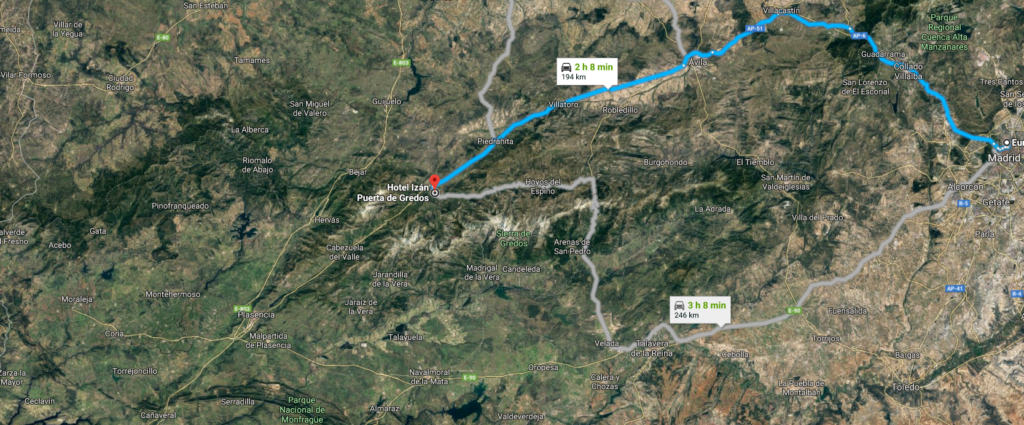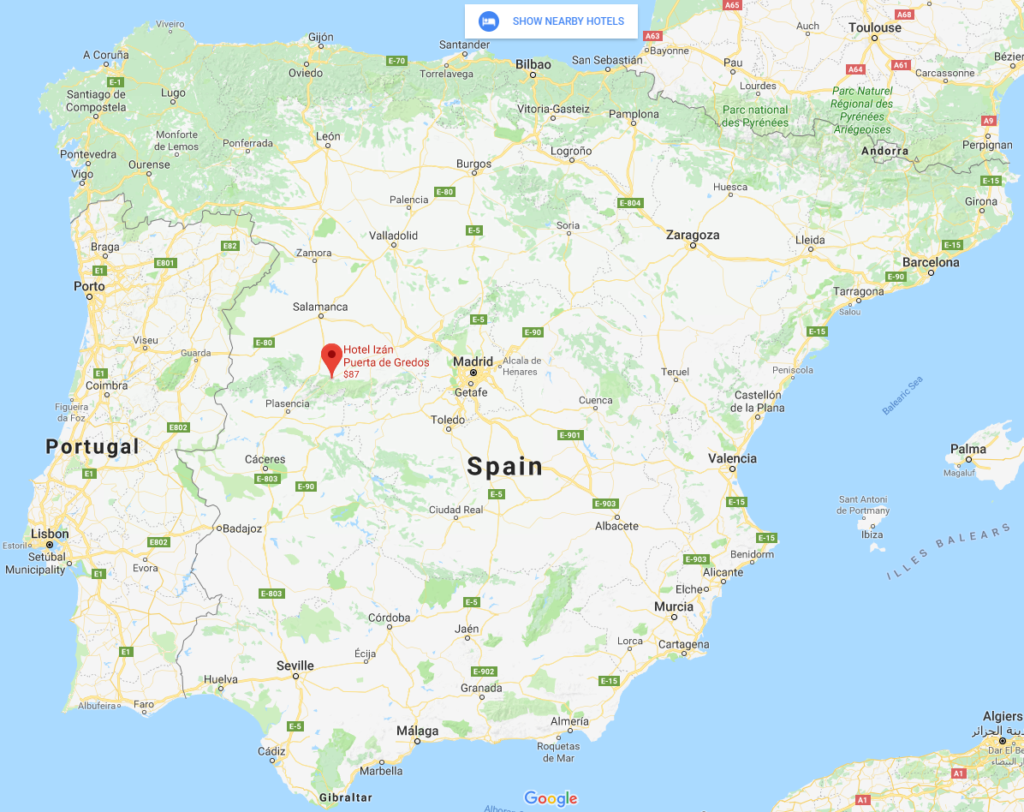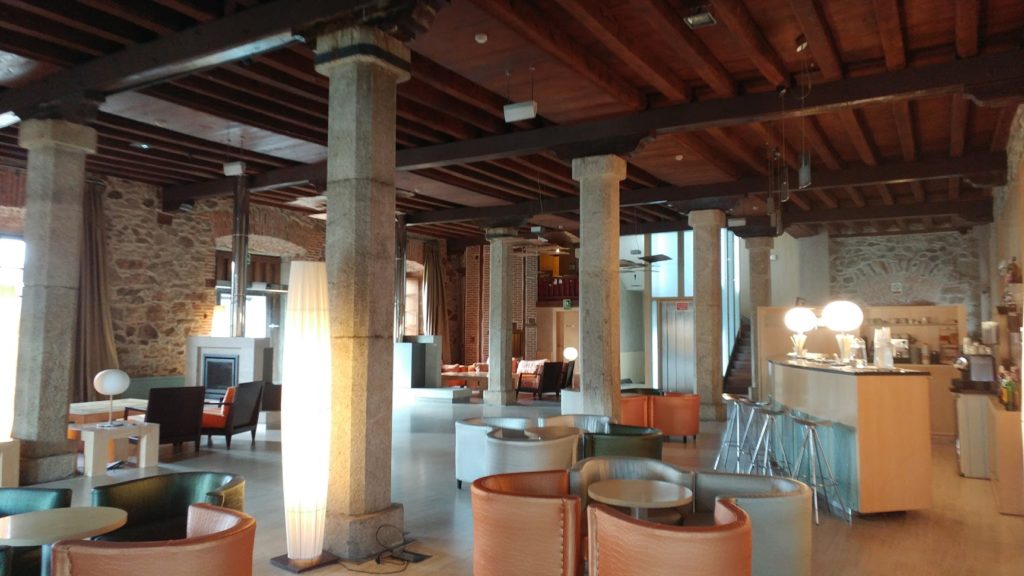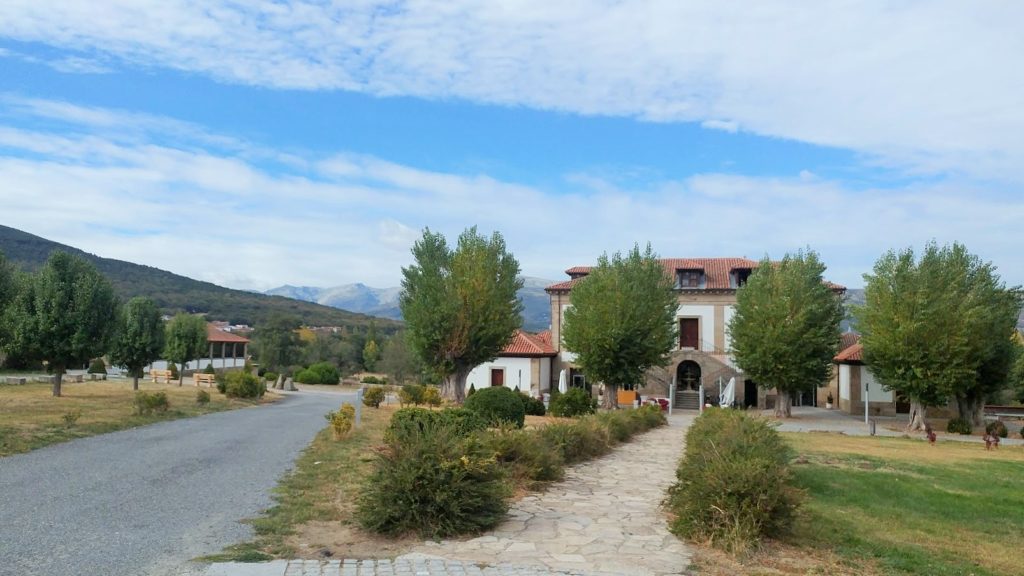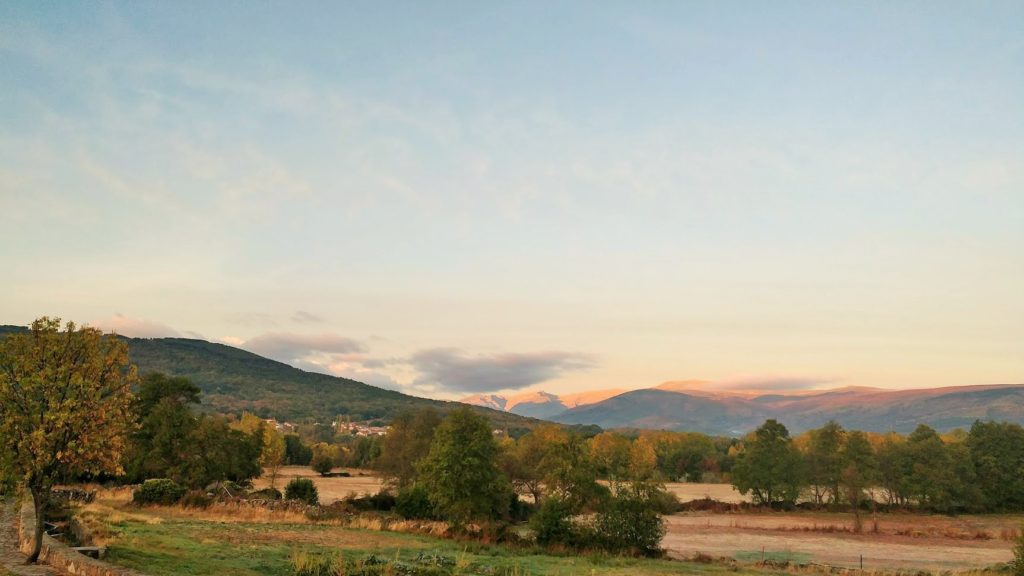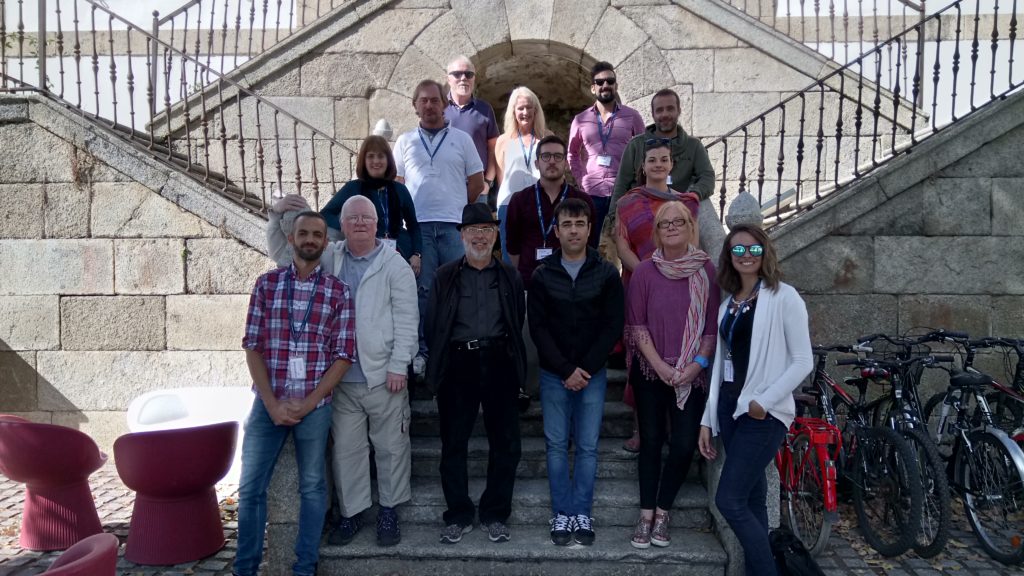Morning in Madrid and a ride to Gredos.
In the morning, Jane and I met another of our group’s volunteers, Chris. Perhaps to his regret, he accepted our invitation to join us as we traipsed about the city. As we would learn later, either due to a poor choice of shoes or from being unaccustomed to walking as much as we did, Chris rubbed and broke open blisters on his feet that left him in some discomfort for several days. Although I could see some of the charm of the neighborhood, probably because it was Sunday morning, it wasn’t quite as vibrant and lively as Jane had described.
When we arrived at the departure point, we met Rosa, the only woman among our Spaniards. The structure of the Fifty-Fifty program on which we were about to embark essentially has the Spaniards in a formal classroom for four hours and engaged in one on one – or in our case occasionally two on one – conversation with the Anglos for another four hours and at meal times. The rule for the Spaniards is that from the moment they board the bus on Sunday afternoon until they disembark from the bus after the return to Madrid the following Friday, they are to speak only English – even among themselves. Perhaps fortunately, perhaps unfortunately, Rosa had a 20 minute head start on the other Spaniards.
We met most of the rest of the group – David, Oscar, and Sotero three of the remaining Spaniards – and Danielle, Shana and David the three remaining Anglos a few minutes before boarding the bus. The instructor for the week, James, joined Giovanna and Fernando as the third member of the Vaughan Town team. The fifth Spaniard, Juan Carlos, drove to the hotel on his own. During our bus ride,
which would take a bit less than three hours including a stop near the old walled city of Ávila, each of the Spaniards would be paired with one Anglo (or, for one, a pair of Anglos) as far as Ávila and with a different Anglo for the remainder of the drive to the hotel and that’s how our conversations began.
Now I’ll explain why I call our stay in Puerto de Gredos “deep Spain.” If you enlarge the map of our drive and look west-northwest of the hotel, you’ll see a town called Vilar Formoso. It’s in Portugal. The larger map below shows that, as the crow flies, we were closer to Portugal than we were to Madrid.
In fact, driving north to Salamanca then turning west and south to Vilar Formoso (the Google Maps recommended route) is only 13 kilometers (about 8 miles) longer than our drive from Madrid to Gredos. I don’t want you to infer anything negative from my label. It’s merely my attempt to recognize that we spent a week in a part of Spain little visited by tourists – especially foreign tourists – who are likely to go to Madrid or Toledo or Barcelona with some of the more adventurous heading off to Valencia, Málaga or Bilbao while the (mainly Catholic, I suspect) seekers of spirituality, including, I would learn, two of the Spaniards in our group, might attempt a pilgrimage along all or part of the Camino del Santiago (dramatized in the film The Way). But even among them, few, I think, would visit Puerto de Gredos.
In point of fact, the hotel was quite lovely
as was the rural setting
where we awoke each morning to the sound of dogs, roosters, and cows and, frankly, were never too far from an olfactory reminder of the presence of the latter. El Barco de Ávila, which is the town nearest our hotel, has a population less than 2,500 and is about two kilometers north from the hotel. The medieval walled city of Ávila is about 90 kilometers away and, with a population of about 58,000, falls in my estimation in the gray area between being a town and a city.
The Program.
After we checked into the hotel and repaired to our rooms for a brief rest, we convened in the meeting room for some additional “getting to know you” exercises before dinner and bed.
The program began in earnest Monday morning. The day started with a buffet breakfast at 09:00. We sat at two tables of five and one of four. The three Vaughan Town employees sat at one table with one volunteer and one of the Spanish students. Two Spanish students each sat at the other two tables. This arrangement – with a mildly enforced rotation between tables – held for each meal.
Every day, the Spaniards were engaged in either classroom or conversational or group activities from 10:00 to 14:00 at which time we broke for lunch until 15:30. The volunteers might be involved in a one on one or two on one conversation or in rehearsing for a group activity but we also had blocks of free time throughout each day. Keep in mind, this meant the students had to function for six and a half hours in a language not their own while we were either resting or prattling on in our mother tongue. Even at my relative level of inactivity, most days I still welcomed the siesta from 15:30-17:00 so I have to believe that for the Spaniards it felt like a heaven sent respite and views like this one
might have reinforced such a notion.
On Monday and Tuesday, when we had quite pleasant weather, many of us used at least one of our conversational hours to walk past some of the farms and down to the nearby Tormes River. I know I did this on Monday morning with Jane and Rosa and on Tuesday with Oscar though Oscar and I had such an intense conversation that we never quite reached the river.
The same pattern of rehearsal, conversation, or class resumed at 17:00 for three hours and then we would gather as a group in a meeting room where we engaged in small group performances of what we had rehearsed during the day. This seemed designed, at least in part, to keep the mood light for the hour before dinner. Another part of each evening’s activities was the requirement that each of the Anglos make a 10 minute presentation to the rest of the group.
By the end of the week, each of the Spaniards would have to make his or her own presentation. There were, however, two crucial differences. The Anglos, were not only speaking in our native language but we were free to choose our own topics. So Chris gave a presentation about giving presentations, Danielle led us in a guided meditation, Shana humorously tried to explain the rules of cricket, David talked about some of his pet linguistic peeves and Jane, who works with students with disabilities gave us a quick lesson in reading braille. As for me, I talked about my short lived accidental experience as a sports writer. The Spaniards, on the other hand, not only had to make their presentation in English but were assigned a topic. So once again, we volunteers had the easier task though each of the Spaniards performed valiantly and admirably.
The photo above was taken a few minutes before we boarded the bus to leave on Friday. As you might expect, even our small group presented a range of personalities. Some among us were quite assertive in expressing a particular point of view while others evinced a more Zen like presence of staying in the moment. Because the Vaughan Town facilitators continually paired us in different combinations I will say that some of those combinations gave rise to some interestingly different group dynamics among the Anglos.
As for the Spaniards, they have my deepest esteem and admiration. I found them to be open and generous both in spirit and in action and that they did so under circumstances that had to be both stressful and exhausting is even more admirable. On Thursday night, after their final presentations and our last supper together, we walked and rode (courtesy of Juan Carlos) into town where we found a small restaurant where drinks and tapas appeared in front of me without my ever opening my wallet. We continued sharing fellowship for some time after we returned to the hotel. It left me with memories I will long cherish.
